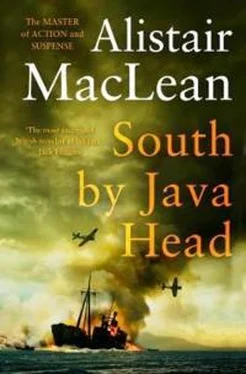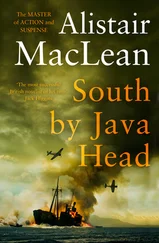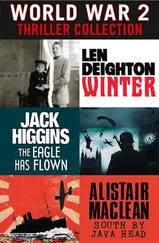“Maybe. Did you see it?”
Nicolson shook his head. “The whole fo’c’sle was practically under water by the time we went aboard. I shouldn’t be surprised. But it could have been jammed by bomb burst.” He swallowed some more of the whisky and grimaced in distaste, not at the drink but at his thoughts. “A pleasant little alternative, drowning or cremation. I should like to meet Captain Siran some day. I suspect a great number of other people would too… How are the rest of our passengers? They got anything to add?”
Findhorn shook his head. “Nothing. Too sick, too tired, too shocked or they just don’t know anything.”
“All sorted out, washed up and bedded down for the night, I suppose?”
“More or less. I’ve got them all over the ship. All the soldiers are together, aft – the two really sick boys in the hospital, the other eight in the smoke-room and the two spare engineers’ cabins on the port side. Farnholme and the priest are together in the engineers’ office.”
Nicolson grinned. “That should be worth seeing – the British Raj breathing the same air as the dusky heathen!”
“You’d be surprised,” Findhorn grunted. “They have a settee each there, a table between them and a bottle of whisky, almost full, on the table. They’re getting along very well indeed.”
“He had a half bottle when I saw him last,” Nicolson said thoughtfully. “I wonder–”
“Probably drank it without coming up for air once. He’s lugging around a great big gladstone bag and if you ask me it’s full of nothing but whisky bottles.”
“And the rest?”
“The what? Oh, yes. The little old lady’s in Walter’s room – he’s taken a mattress into his radio room. The senior nurse, the one that seems to be in charge–”
“Miss Drachmann?”
“That’s her. She and the child are in the apprentices’ cabin. And Vannier and the Fifth engineer have doubled up with Barrett and the fourth engineer – two nurses in Vannier’s cabin and the last of them in the Fifth’s.”
“All accounted for.” Nicolson sighed, lit a cigarette and watched the blue smoke drift lazily up to the ceiling, “I only hope they haven’t exchanged the frying pan for the fire. We having another go at the Carimata Straits, sir?”
“Why not? Where else can we–” He broke off as Nicolson stretched out for the ringing telephone and put it to his ear. “Yes, captain’s cabin… Oh, it’s you, Willy… Yes, he’s here. Hang on a minute.”
Nicolson rose easily to his feet, vacating his seat for the captain. “The second engineer, sir.”
Findhorn talked for perhaps half a minute, mostly in monosyllabic grunts.
Nicolson wondered idly what Willoughby had wanted. He had sounded almost bored but then nobody had ever seen Willoughby excited about anything. Ernest Willoughby never found anything in life worth getting excited about. A crazy, dreaming old coot – he was the oldest man in the ship – with a passion for literature matched only by his utter contempt for engines and the means whereby he earned his livelihood, he was the most honest man, and the most completely unselfish, that Nicolson had ever met. Willoughby himself took no pride in this, and was probably unaware of it: he was a man who had little, but wanted nothing at all. With him Nicolson had little in common, superficially at any rate: but, almost as if by the attraction of opposites, he had formed the greatest liking and admiration for the old engineer, and Willoughby, unmarried and with only a threadbare bed-sitting-room in the company club in Singapore, had spent a good few evenings in his home. Caroline, he remembered, had thought the world of old Willy and had usually made a point of seeing that the best meals and the longest, coolest drinks were always waiting for the old engineer. Nicolson stared down at his glass, and his mouth twisted in bitter memory… Suddenly he became aware that Captain Findhorn was on his feet, looking down at him with a peculiar expression on his face.
“What’s the matter, Johnny? You feel all right?”
“Just wandering, sir.” Nicolson smiled and waved a hand at the whisky bottle. “A great help, this, when you’re taking a walk around in your mind.”
“Help yourself: take another walk round.” Findhorn picked up his hat and turned for the door. “Wait here for me, will you? I have to go below.”
Two minutes after the captain had gone the phone rang again. It was Findhorn speaking, asking Nicolson to come below to the dining-saloon. He gave no reason. On his way below Nicolson met the fourth officer coming out of the wireless operator’s cabin. Vannier was looking neither happy nor pleased. Nicolson looked at him, an eyebrow raised in interrogation, and Vannier glanced back at the wireless operator’s door, his expression a nice mixture of indignation and apprehension.
“That old battle axe in there is in full cry, sir.” He kept his voice low.
“The what?”
“Miss Plenderleith,” Vannier explained. “She’s in Walter’s cabin. I was just dropping off to sleep when she started hammering on the bulkhead between us, and when I ignored that she went out to the passage and started calling.” Vannier paused, then went on feelingly: “She has a very loud voice, sir.”
“What did she want?”
“The captain.” Vannier shook his head incredulously. “ ‘Young man, I want to see the captain. At once. Tell him to come here.’ Then she pushed me out the door. What will I do, sir?”
“Exactly what she asks, of course.” Nicolson grinned. “I want to be there when you tell him. He’s below in the saloon.”
They dropped down one deck and went into the dining-saloon together. It was a big room, with two fore-and-aft tables with seating for twenty. But it was almost empty now: there were only three people there and they were all standing. The captain and the second engineer stood side by side, facing aft, giving easily with the rolling of the ship. Findhorn, immaculately correct in uniform as always, was smiling. So was Willoughby, but there all resemblance between the two men ended. Tall, stooped, with a brown, wrinkled face and a thick, unkempt shock of grey hair, Willoughby was a tailor’s nightmare. He wore a white shirt – what had originally been a white shirt – unpressed, buttonless and frayed at the collar and half-sleeves, a pair of khaki duck trousers, wrinkled like an elephant’s legs and far too short for him, diamond-patterned plaid socks and unlaced canvas shoes. He hadn’t had a shave that day, he probably hadn’t had a shave that week.
Half-standing, half-leaning against the buffet table, the girl was facing them, hands gripping the edge of the table to steady herself. Nicolson and Vannier could see only her profile as they went in, but they could see that she, too, was smiling, the righthand corner of her mouth curving up and dimpling the olive-tinted peach of her cheek. She had a straight nose, very finely chiselled, a wide smooth forehead, and long, silky hair gathered in a deep roll round her neck, hair black with that intense blackness that reflects blue under the strong sun and gleams like a raven’s wing. With her hair, complexion and rather high cheekbones, she was a typical Eurasian beauty: but after a long, long look – and all men would always give Miss Drachmann a long, long look – she was neither typical nor Eurasian: the face was not broad enough, the features were too delicate and those incredible eyes spoke only of the far north of Europe. They were as Nicolson had first seen them in the harsh light of his torch aboard the Kerry Dancer – an intense, startling blue, very clear, very compelling, the most remarkable features in a remarkable face. And round and beneath these eyes, just then, were the faint, blue smudges of exhaustion.
Читать дальше
Конец ознакомительного отрывка
Купить книгу










